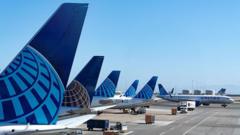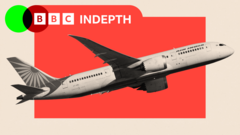The Trump administration is taking a significant step as it has initiated an investigation into the imports of commercial aircraft, jet engines, and their associated parts, a move that may eventually lead to the implementation of new tariffs. This investigation, which started on May 1 under the Trade Expansion Act, allows the president to impose tariffs on foreign goods based on national security concerns.
Previously, President Trump utilized this authority to establish tariffs on aluminum and steel and has opened investigations into other sectors, including semiconductors and pharmaceuticals. The inquiry aims to gather information regarding the domestic demand for these aviation products and determine the feasibility of meeting it within the United States, as well as assess the influence of foreign suppliers in the marketplace.
It's noteworthy that the aerospace sector has long contributed to the U.S. economy with a trade surplus, projected to reach $125 billion this year, making it a crucial industry that depends heavily on a specialized global supply chain. Eric Fanning, the president of the Aerospace Industries Association, emphasized the sector's achievements in job creation and innovation, expressing eagerness to collaborate with the Commerce Department to strengthen domestic capabilities while preserving the trade environment that bolsters U.S. aerospace competitiveness.
Boeing, one of the leading manufacturers in the industry, indicated that while the immediate effects of existing tariffs have been minor, the overall implications for their suppliers raise concerns. Boeing's CEO, Kelly Ortberg, shared that the company is currently dealing with a 10 percent tariff on imported components from Japan and Italy but anticipates recovering these costs through future sales.
Additionally, companies like RTX and GE Aerospace have reported substantial costs from tariffs, estimating losses of approximately $850 million and $500 million respectively for the current year. Historically, governments have sought to shield and foster their aviation sectors through tariffs and subsidies, as evidenced by years of disputes between the United States and the European Union regarding unfair advantages given to Boeing and Airbus.
In a recent resolution, the U.S. and Europe agreed to conclude a longstanding conflict over subsidies and will instead focus collaboratively on countering China's rising influence across key industries, marking a pivotal moment in transatlantic trade relations.
Niraj Chokshi reports on the advancements and challenges within the aviation and transportation sectors. Follow more updates on U.S. politics, major aircraft manufacturers, and international trade relations.






















